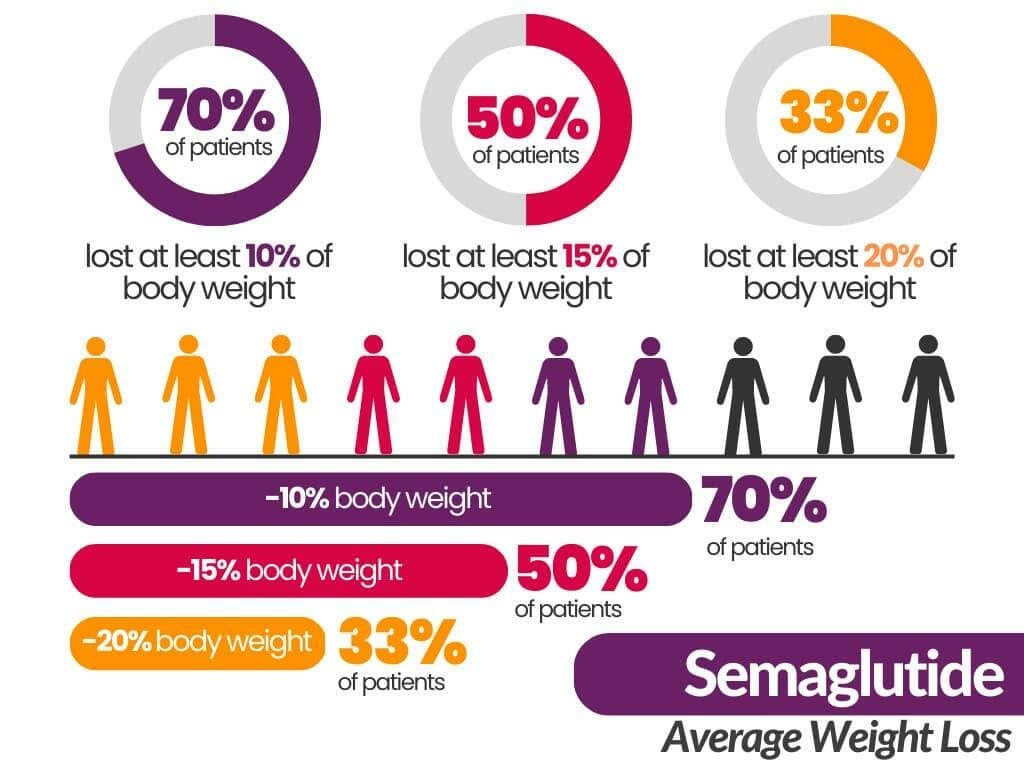Interested in shedding those extra pounds? Look no further than semaglutide! In this article, discover the secret behind losing weight with semaglutide. Whether you’re a health enthusiast or someone looking to kickstart your weight loss journey, semaglutide might just be the answer you’ve been searching for. With its unique properties and promising results, you’ll be amazed at how this medication can help you achieve your weight loss goals. So, buckle up and get ready to embark on an exciting journey to a healthier you!
Understanding Semaglutide
Defining Semaglutide
Semaglutide is a medication that belongs to a class of drugs called glucagon-like peptide-1 receptor agonists (GLP-1 agonists). It is primarily used for the treatment of type 2 diabetes, but it has also shown significant potential in promoting weight loss. Semaglutide works by mimicking the effects of a hormone called glucagon-like peptide-1 (GLP-1), which regulates blood sugar levels and appetite.
How Semaglutide works
Semaglutide works by binding to GLP-1 receptors in the pancreas, which stimulates insulin secretion and reduces glucagon production. This helps to lower blood sugar levels and improve glycemic control in individuals with type 2 diabetes. Additionally, semaglutide slows down the emptying of the stomach, which creates a feeling of fullness and reduces hunger. By targeting these mechanisms, semaglutide not only helps manage diabetes but also aids in weight loss.
Consistency and effectiveness of Semaglutide
Semaglutide has been proven to be consistently effective in promoting weight loss in clinical trials. In one study, participants using semaglutide achieved an average weight loss of 12-15% over a 68-week period. This weight loss was significantly greater compared to individuals receiving a placebo. The effectiveness of semaglutide in weight loss has been proven to be consistent across various populations, including individuals without diabetes.
Semaglutide and Weight Loss
The role of Semaglutide in weight loss
Semaglutide plays a crucial role in weight loss by addressing two key factors: reducing appetite and increasing satiety. By binding to GLP-1 receptors in the brain, semaglutide helps regulate the appetite control centers, leading to a decreased desire for food. Additionally, semaglutide slows down the gastric emptying process, creating a feeling of fullness that lasts longer. These combined effects significantly contribute to weight loss by reducing overall calorie intake.
Why Semaglutide is effective in weight loss
Semaglutide is particularly effective in weight loss because it targets multiple mechanisms involved in appetite regulation and energy balance. By mimicking the effects of GLP-1, it helps to control blood sugar levels, reduce cravings, and increase feelings of fullness. The sustained weight loss experienced by individuals on semaglutide is attributed to these comprehensive actions, which go beyond simple appetite suppression.
Clinical studies linking Semaglutide to weight loss
Numerous clinical studies have demonstrated the significant weight loss benefits of semaglutide. In a 68-week study involving over 1,900 participants with obesity and without diabetes, semaglutide was associated with an average weight loss of 14.9%, compared to 2.4% with the placebo. These findings were consistent across different demographic groups and are indicative of semaglutide’s efficacy in promoting weight loss.

How To Use Semaglutide For Weight Loss
Correct dosage for weight loss
The recommended dosage of semaglutide for weight loss is 2.4 mg once a week. This dosage has been shown to be most effective in achieving significant weight loss. It is important to follow the prescribed dosage and not exceed it, as higher doses may increase the risk of side effects without providing additional weight loss benefits.
When and how to take Semaglutide
Semaglutide is typically administered as an injection once a week, preferably on the same day each week. It can be self-administered using a pre-filled pen device provided by the healthcare professional. The injection should be administered subcutaneously, which means just under the skin, preferably in the abdomen or thigh. It is important to thoroughly read and follow the instructions provided by the healthcare professional or the medication’s packaging.
Long-term use of Semaglutide for weight loss
Semaglutide is generally considered safe for long-term use in the treatment of obesity. A study conducted over a three-year period demonstrated that the weight loss achieved with semaglutide could be sustained with continued use. However, it is important to regularly evaluate the progress and effectiveness of the treatment in consultation with a healthcare professional.
Side Effects of Semaglutide
Common side effects
Common side effects associated with semaglutide include nausea, vomiting, diarrhea, constipation, stomach pain, and decreased appetite. These side effects are generally mild and diminish over time as the body adjusts to the medication. It is important to note any persistent or severe side effects and discuss them with a healthcare professional.
Rare but serious side effects
Although rare, there have been reported instances of acute pancreatitis and medullary thyroid carcinoma (a form of thyroid cancer) in individuals using semaglutide. These serious side effects require immediate medical attention. It is crucial to notify a healthcare professional if any unusual symptoms like severe abdominal pain or changes in the thyroid are experienced.
Managing side effects
Mild side effects of semaglutide can often be managed through lifestyle modifications and temporary adjustments in diet. For example, starting with a lower dosage and gradually increasing it over time can help the body adapt to the medication and reduce gastrointestinal side effects. It is important to discuss any side effects with a healthcare professional to determine the best course of action.
Monitoring Your Progress
How quickly to expect results
The rate of weight loss on semaglutide varies from person to person. Some individuals may experience significant weight loss within a few weeks, while others may take longer to see noticeable changes. It is important to be patient and maintain consistent use of semaglutide while implementing lifestyle changes to support weight loss.
Setting realistic weight loss goals with Semaglutide
When using semaglutide for weight loss, it is important to set realistic goals based on individual circumstances. A weight loss of 5-10% of total body weight within 3-6 months is generally considered achievable and beneficial for overall health. Consulting with a healthcare professional can help determine appropriate weight loss targets based on individual needs and medical history.
The importance of regular health check-ups
While using semaglutide for weight loss, it is essential to schedule regular check-ups with a healthcare professional. Monitoring blood sugar levels, assessing overall health, and evaluating progress are important aspects of successful weight loss. Healthcare professionals can provide valuable guidance, make adjustments if necessary, and ensure that semaglutide is effectively supporting weight loss efforts.
Lifestyle Changes to Enhance Semaglutide Effectiveness
Importance of diet and exercise
To enhance the effectiveness of semaglutide in weight loss, adopting a healthy lifestyle that includes a balanced diet and regular exercise is crucial. A diet rich in fruits, vegetables, whole grains, lean proteins, and healthy fats can support weight loss efforts. Regular physical activity, such as brisk walking or aerobic exercises, can further enhance weight loss and overall well-being.
Hydration and Semaglutide
Proper hydration is essential when using semaglutide for weight loss. Drinking an adequate amount of water throughout the day can help prevent dehydration, especially when experiencing initial side effects such as nausea or diarrhea. It is important to consult with a healthcare professional to determine the ideal daily water intake based on individual needs.
Stress management and sleep
Stress management and quality sleep are crucial aspects of successful weight loss. High levels of stress can disrupt appetite regulation and lead to unhealthy eating habits. Therefore, incorporating stress-reducing activities such as meditation, yoga, or engaging hobbies can complement the effects of semaglutide. Additionally, getting sufficient sleep, ideally 7-9 hours a night, supports overall well-being and helps maintain consistent weight loss.

Interactions with Other Drugs
Drugs that can interfere with Semaglutide
Some medications, such as corticosteroids, diuretics, and certain asthma medications, may interact with semaglutide and affect its efficacy or increase the risk of side effects. It is important to inform a healthcare professional about all current medications, including over-the-counter drugs and supplements, to ensure safe and effective use of semaglutide.
Safely using Semaglutide with other medications
In many cases, semaglutide can be safely used with other medications. A healthcare professional can assess potential drug interactions and recommend adjustments, if necessary, to ensure the safe combination of medications. Regular check-ups and consistent communication with the healthcare professional are crucial to monitor any changes in treatment plans and address possible concerns.
Consulting a healthcare professional before starting Semaglutide
Before initiating semaglutide treatment, it is important to consult with a healthcare professional. They can assess individual health conditions, consider potential contraindications or drug interactions, and provide personalized guidance regarding the safe and effective use of semaglutide for weight loss.
Precautions and Contraindications
Who shouldn’t use Semaglutide
Semaglutide is not recommended for individuals with a personal or family history of medullary thyroid carcinoma, multiple endocrine neoplasia syndrome type 2 (MEN 2), or a known hypersensitivity to semaglutide or any of its components. Individuals with severe gastrointestinal disease or gastroparesis should also avoid using semaglutide.
Pre-existing conditions and Semaglutide
Individuals with certain pre-existing conditions need to use semaglutide with caution and under the supervision of a healthcare professional. Conditions such as pancreatitis, renal impairment, or a history of gallstones may require dose adjustments or close monitoring during semaglutide treatment. It is essential to disclose all pre-existing conditions to the healthcare professional before starting semaglutide.
Semaglutide during pregnancy and breastfeeding
Semaglutide is not recommended for use during pregnancy or breastfeeding. Its safety and efficacy in these situations have not been established, and potential risks to the fetus or infant cannot be ruled out. If pregnancy is planned or confirmed while on semaglutide, it is important to discuss alternative treatment options with a healthcare professional.
Maintaining Weight Loss after Semaglutide Treatment
Transitioning off Semaglutide
When discontinuing semaglutide treatment, it is important to transition into a maintenance phase to sustain the weight loss achieved during treatment. This involves continuing healthy lifestyle habits, such as balanced eating and regular exercise, that were established during semaglutide use. Gradually reducing the dosage of semaglutide under the guidance of a healthcare professional can help facilitate this transition.
Maintaining a healthy lifestyle post-Semaglutide
To maintain weight loss after semaglutide treatment, it is essential to continue following a healthy lifestyle that includes a nutritious diet and regular physical activity. Incorporating long-term behavior changes, such as mindful eating, portion control, and finding enjoyable physical activities, can help sustain weight loss and prevent weight regain.
Possible weight gain after stopping Semaglutide
While weight regain is possible after discontinuing semaglutide, adopting a healthy lifestyle can greatly minimize this risk. It is important to remember that sustainable weight loss requires consistent efforts and a long-term commitment to a healthy lifestyle. Regular check-ups with a healthcare professional can provide ongoing support and guidance during the post-semaglutide phase.
Patient Experiences and Reviews
Sharing real-life experiences
Many individuals have shared their success stories and experiences with semaglutide for weight loss. These real-life accounts reflect the potential benefits and challenges associated with semaglutide treatment. While personal experiences may vary, these stories can provide valuable insights and inspiration for individuals considering semaglutide as a weight loss option.
Success stories of weight loss with Semaglutide
Numerous success stories highlight the effectiveness of semaglutide in achieving significant weight loss. Individuals have reported improved overall health, increased energy levels, and enhanced self-confidence as a result of their weight loss journey with semaglutide. These success stories serve as a testament to the positive impact that semaglutide can have on weight loss and overall well-being.
Dealing with challenges during Semaglutide treatment
Like any weight loss journey, semaglutide treatment may present certain challenges for individuals. Common challenges reported include managing the initial gastrointestinal side effects, adjusting to a new routine for injections, and incorporating lifestyle changes alongside semaglutide use. However, with the support of healthcare professionals and personal determination, these challenges can be overcome, leading to successful weight loss outcomes.
In conclusion, semaglutide has emerged as a promising medication for weight loss, effectively targeting appetite regulation and promoting sustained weight loss in individuals with or without diabetes. When used in conjunction with a healthy lifestyle, semaglutide can be a valuable tool in achieving weight loss goals. It is important to consult with a healthcare professional to determine the suitability of semaglutide and receive personalized guidance throughout the treatment process. With the right approach and support, semaglutide can pave the way for long-term weight management and improved overall health.









Leave a Reply
You must be logged in to post a comment.